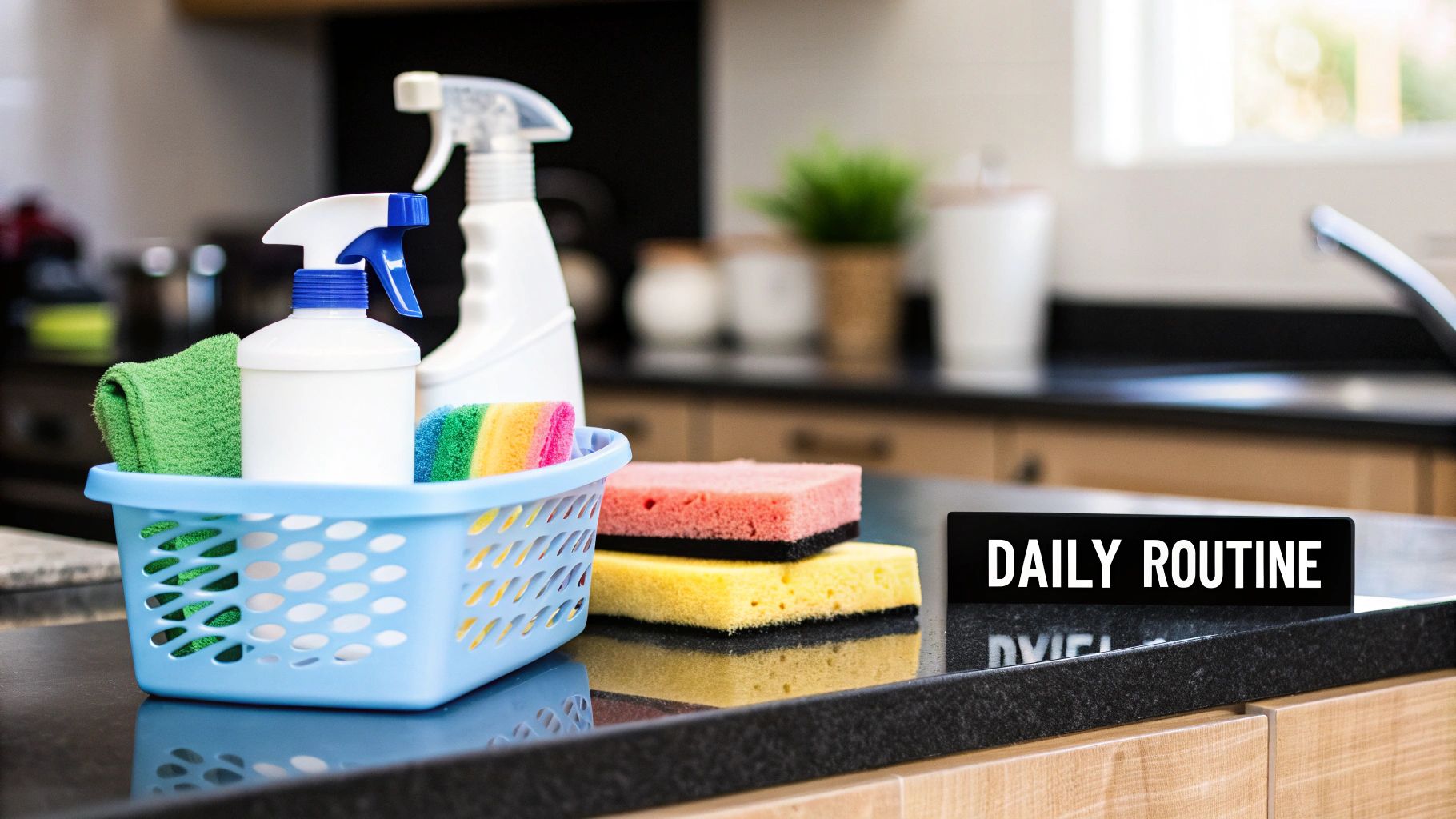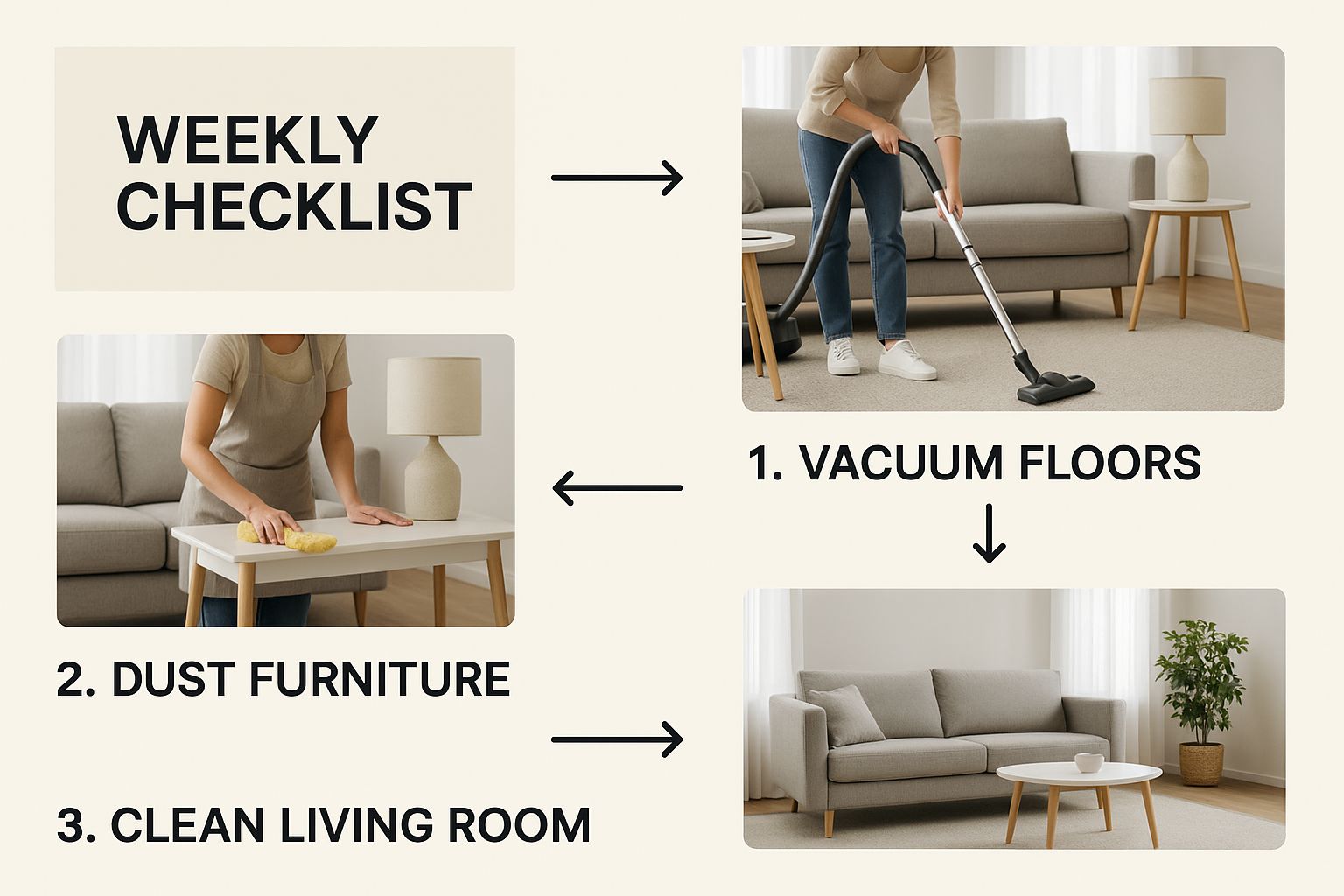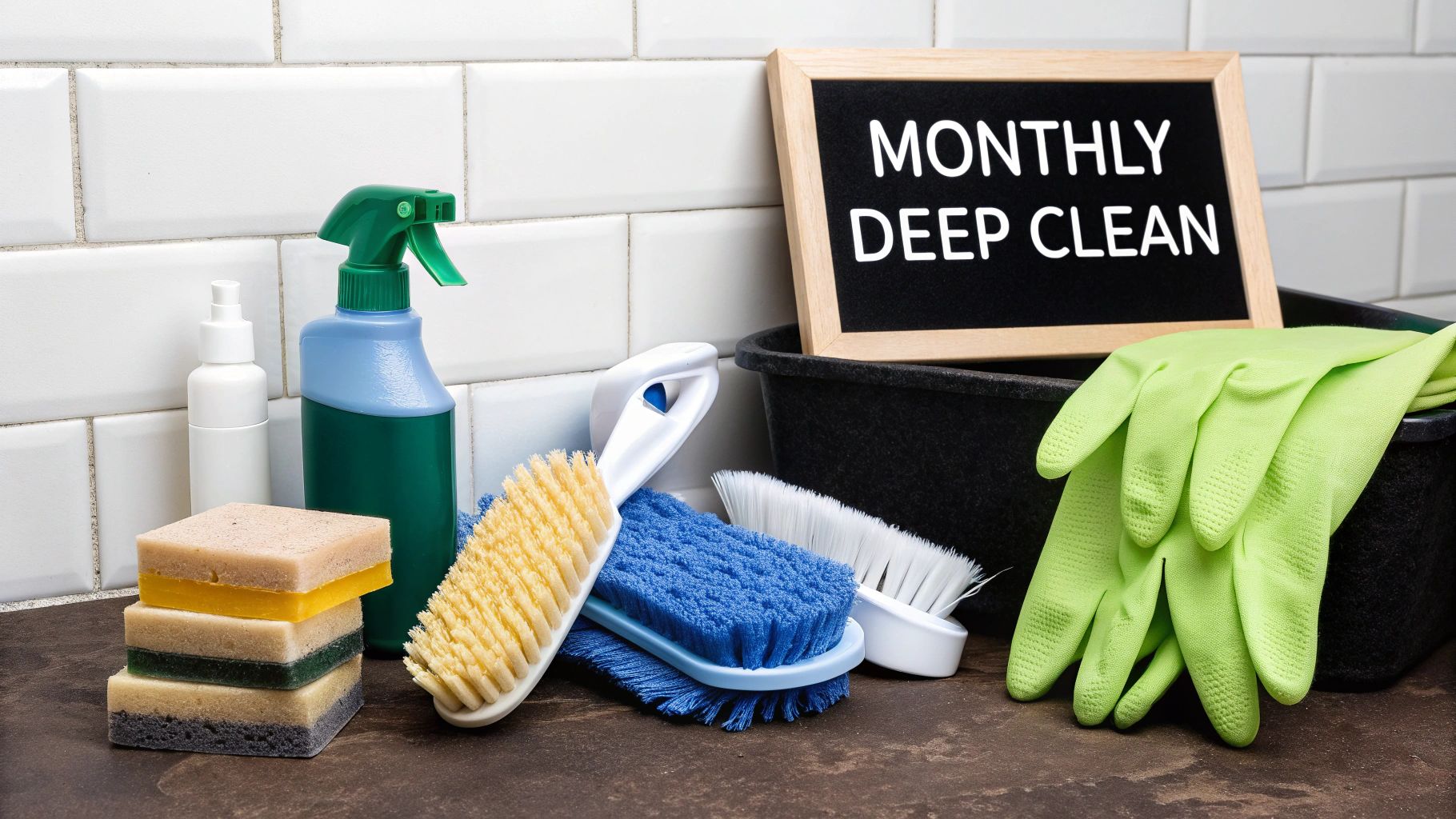Why Your Current Cleaning Approach Falls Short

Does it feel like you’re stuck in a cleaning groundhog day? You spend your precious weekend hours on a cleaning blitz, only to watch the clutter and dust bunnies creep back by mid-week. If you feel like you’re constantly playing catch-up, you're not alone. This "clean when it's a disaster" method is a recipe for burnout and frustration.
The real issue is that this reactive approach only tackles the surface-level chaos after it’s already taken over. It’s like bailing water out of a boat without fixing the leak. The key is to shift from reactive cleaning to proactive maintaining. This is where a simple house cleaning schedule comes in, helping you manage chores systematically before they become overwhelming.
The Psychology of Procrastination
So, why do we put off cleaning? Often, the thought of "cleaning the house" feels like a huge, undefined monster of a task. Without a clear starting point, it's easy to get paralyzed and push it off. This feeling is backed by some surprising numbers. While the average person spends 2 to 4 hours per week cleaning, a whopping 7 in 10 people feel it’s still not enough.
That time adds up. Over a lifetime, you could spend nearly 1.5 years just on cleaning! If you want to dive deeper, you can discover more revealing cleaning industry statistics and see how they relate to households just like yours. This disconnect between time spent and results seen is a huge source of stress.
A Smarter Way Forward
Feeling exhausted despite all the hours you put in is a clear sign that your strategy needs an update. A structured house cleaning schedule breaks down the work into small, bite-sized tasks for each day and week. Instead of staring at a mountain of chores on Saturday, you’re handling a few small hills throughout the week.
This approach not only keeps your home consistently cleaner but also frees up your weekends for things you actually enjoy. It’s all about working smarter, not harder, to reduce the mental burden of a perpetually messy space.
Crafting Your Daily Cleaning Foundation That Actually Works
The real secret to a consistently clean home isn’t spending your entire Saturday on a cleaning marathon. It's about building a foundation of small, manageable daily habits that stop clutter and grime from ever reaching crisis mode. A smart daily routine is the difference between feeling constantly behind and feeling peacefully in control. The aim isn't a flawless home every single day, but a system that keeps small messes from snowballing into overwhelming projects.
The Power of 15-Minute Resets
Forget about blocking off hours each day for cleaning. The most effective daily routines are built on short, focused bursts of activity. Many people find success with a simple 10-15 minute "reset" in the morning and another one in the evening. This isn't a deep clean; it's all about maintenance.
For example, a morning reset could look something like this:
- Make the bed (takes about 2 minutes).
- Wipe down the bathroom counter after getting ready (just 1 minute).
- Load any breakfast dishes straight into the dishwasher (around 3 minutes).
Likewise, an evening reset can tackle the day's clutter before it has a chance to settle in overnight. This might involve a quick toy roundup with the kids, wiping down kitchen counters after dinner, and setting out clothes for the next day. These tiny actions are the cornerstone of a practical house cleaning schedule because they seriously cut down on the work needed for your bigger weekly cleans.
Daily Must-Dos vs. Unnecessary Chores
Let's be realistic: not every task needs your attention every day. Wiping down kitchen counters is a daily must for hygiene, but do you really need to dust the living room every single day? Probably not. The key is to identify the high-impact tasks that make the biggest difference in your home.
If you have a furry friend, a quick daily sweep of high-traffic floors might be non-negotiable. But for someone living alone, that might be overkill. To help you figure out what's truly essential, here’s a breakdown of common daily tasks, their priority, and how long they typically take.
| Room | Essential Daily Tasks | Time Required | Priority Level |
|---|---|---|---|
| Kitchen | Wipe counters, load dishwasher, spot-clean floor | 5-7 minutes | High |
| Bathroom | Wipe sink & counter, quick toilet swish | 2-3 minutes | High |
| Living Room | Tidy up clutter (pillows, remotes, mail) | 3-5 minutes | Medium |
| Bedroom | Make the bed, put away clothes | 2-4 minutes | High |
| Entryway | Put away shoes & bags, sort mail | 1-2 minutes | Medium |
This table shows how focusing on high-priority tasks in key rooms can keep your home tidy in just 15-20 minutes a day. You can adjust the priorities based on your own home and lifestyle.

By handling these daily essentials, you ensure that bigger jobs like vacuuming and dusting are for maintenance, not disaster recovery. It’s all about working smarter, not harder.
Building Your Weekly Cleaning Rhythm Without Burnout

While daily tidying keeps the mess from taking over, your weekly tasks are what deliver that truly satisfying, deep-clean feeling. This is when you handle the bigger jobs—vacuuming all the floors, scrubbing the bathrooms, and swapping out the bed linens. But trying to cram all of this into a single Saturday marathon is a surefire way to resent your weekend and burn out. A better house cleaning schedule spreads the work out, so you never feel like cleaning is stealing your free time.
Finding Your Weekly Flow: Two Proven Methods
The secret is to find a system that actually fits your home and your personal energy levels. Two of the most popular and effective strategies are task batching and the one-room-a-day approach.
-
Task Batching: This method is all about grouping similar chores. You might declare one day "floor day" and vacuum and mop all the hard surfaces in your home at once. Another day could be dedicated to dusting everything. This approach is super efficient because you're already in the zone with the right tools out.
-
One-Room-a-Day: With this strategy, you focus all your weekly cleaning efforts on one specific room each day. Monday could be for the master bathroom, Tuesday for a deep kitchen clean, and Wednesday for the living room. This is a fantastic way to avoid feeling overwhelmed, especially in larger homes, since you only have to think about one space at a time.
Making It Work for You
Let's think about a busy family of four. For them, trying to deep clean the kitchen on a Tuesday night filled with homework and soccer practice just isn't realistic. Task batching on the weekend might be a better fit. They could spend an hour on Saturday morning vacuuming and mopping and another hour on Sunday tackling bathrooms.
On the other hand, someone living alone or a couple might love the one-room-a-day method to keep their weekends completely open. A quick 30-minute blitz in the living room on a Monday evening feels far more achievable than a dreaded four-hour cleaning session on a Saturday. The best weekly house cleaning schedule is simply the one you can stick to without feeling exhausted. Try both methods for a week or two and see which one brings more calm and less stress to your routine.
Monthly Deep Cleaning That Actually Happens
If your monthly to-do list feels more like a "maybe next month" list, you're not alone. Monthly deep cleaning tasks are notorious for getting pushed aside because they seem huge and endless. The secret to finally conquering them isn’t finding a magical free weekend—it’s breaking them down into small, targeted jobs that don’t feel like a massive commitment. A well-structured monthly house cleaning schedule focuses on high-impact tasks, preventing grime buildup in those forgotten corners.
Tackling Monthly Tasks in Bite-Sized Pieces
Instead of trying to "deep clean the entire house" in one go, assign just one or two bigger tasks to each month. This method makes deep cleaning a manageable part of your routine rather than an overwhelming project you dread. For example, one month could focus on appliance maintenance, while the next is dedicated to organizing closets.
This approach prevents burnout and ensures these crucial tasks actually get done. It’s about being strategic. Wiping down baseboards one month and cleaning light fixtures the next is far more achievable than trying to do both, plus everything else, in a single day. Think of it as rotating your focus, which maintains your home’s overall cleanliness without demanding impossible amounts of time.
Here’s a practical way to group these tasks:
- Appliance Focus: Clean inside the oven, descale the coffee maker, and deep clean the microwave.
- Textile Refresh: Wash all curtains, duvet covers, and throw pillow inserts.
- Hidden Grime: Pull out furniture to vacuum behind it and wash down baseboards.
For a more exhaustive breakdown, you might be interested in our guide on essential deep cleaning checklists for professional maids, which can help you identify those often-missed spots. By creating a rotating monthly house cleaning schedule, you tackle the big jobs bit by bit, ensuring your home gets the thorough attention it needs without sacrificing your entire weekend to do it.
Customizing Your Schedule for Your Actual Life
A generic, one-size-fits-all checklist rarely works because it doesn't account for the beautiful, chaotic reality of your actual life. A truly effective house cleaning schedule is a living document, one that’s ready to bend and flex with your unique situation. The goal isn’t to achieve a perfect, show-home-ready space 24/7; it's to create a sustainable system that brings you peace, not more pressure.
Tailoring Tasks to Your Household
Take a moment to think about who lives in your home. A single person working from a quiet apartment has completely different cleaning needs than a bustling family with three kids and a Golden Retriever shedding everywhere.
- For Households with Pets: You'll probably need to vacuum and wipe down surfaces more often. Instead of a once-a-week vacuuming session, you might add a quick 10-minute pass through high-traffic areas every other day to stay on top of pet hair and dander.
- For Families with Young Children: Spills and sticky fingerprints are just part of the deal. A great adjustment is to create small "reset zones." For example, keeping a designated basket in the living room for a quick toy roundup before bed can be a game-changer. This is also a perfect time to introduce age-appropriate chores; even a toddler can help put their toys away.
- For Roommate Situations: A shared schedule is absolutely essential for keeping the peace. Instead of assigning entire rooms, try rotating specific tasks weekly. One week, a roommate might be in charge of kitchen floors and counters; the next, they handle the shared bathroom. This approach keeps things fair and helps prevent resentment from building up.
Adapting to Home Size and Lifestyle
The space you live in also plays a huge role in your cleaning strategy. Tidying up a 700-square-foot apartment is a different challenge entirely than managing a sprawling 3,000-square-foot house. For smaller homes, your focus should be on multi-purpose cleaning tools and smart storage to cut down on clutter.
In a larger home, a zone-cleaning approach—where you tackle one section of the house each day—can make the workload feel much less daunting. You can discover more strategies on how to create a cleaning schedule that fits your home's unique layout and your family's rhythm. A flexible plan is your best defense against feeling overwhelmed by your to-do list.
Tools, Products, and Game-Changing Hacks That Matter
A great house cleaning schedule is one thing, but having the right gear to back it up makes all the difference. You could have the best plan in the world, but without the right tools, you're just working harder, not smarter. The market is packed with gadgets that promise to revolutionize your cleaning routine but often end up collecting dust. The secret isn't a closet full of supplies; it's a small, smart arsenal that cuts down your cleaning time.
The Tools That Actually Work
You don’t need an entire aisle of specialized cleaners to get the job done. Professionals and seasoned homeowners know it’s about a core group of versatile workhorses. Think high-quality microfiber cloths that grab dust instead of just pushing it around, a simple squeegee for perfectly streak-free windows and shower doors, and a powerful but lightweight vacuum with useful attachments.
A long-handled duster is another unsung hero for hitting those hard-to-reach ceiling fans and tall shelves. These items are the backbone of an effective cleaning caddy, saving you from a cluttered cabinet and making your weekly tasks feel less like a marathon.
Time-Saving Hacks and Smart Solutions
Beyond the products, it’s the techniques that truly elevate your cleaning game. For example, have you ever tried letting your bathroom cleaner sit on surfaces for 5-10 minutes before you start scrubbing? It’s a simple trick, but it lets the chemicals do the hard work for you, so you don't have to. Another pro tip is to always clean from top to bottom. This lets gravity work in your favor, forcing dust and debris downward so you only have to vacuum or mop once at the very end.
This focus on efficiency is a big reason the professional cleaning industry is thriving. In fact, the global house cleaning market is projected to reach $41.15 billion by 2025, as more people choose to outsource chores to save precious time. You can read more about the growing cleaning industry to understand this trend. By adopting these smarter, pro-level strategies—even without hiring help—you can transform your own routine from a draining chore into a quick, satisfying task.
Making Your Schedule Stick When Life Gets Complicated
So, you’ve created the perfect house cleaning schedule. Your daily, weekly, and monthly tasks are neatly organized. But then, life happens. A sick kid, an unexpected project at work, or sheer exhaustion can derail your best-laid plans. The real test isn't just making the schedule; it's building one that can bend without breaking when things get chaotic. It’s important to ditch the all-or-nothing thinking, where one missed task makes you feel like the whole system has collapsed.
The Power of Habit Stacking
Getting a new routine to stick is much easier when you connect it to something you already do on autopilot. This is a simple but effective idea from behavioral psychology known as habit stacking. Instead of trying to carve out brand-new time for cleaning, just attach a small cleaning task to an established habit. For example, right after you finish your morning coffee (your existing habit), take five minutes to wipe down the kitchen counters (your new habit). This pairing makes the task feel like a natural extension of your routine, not another chore to dread. Before you know it, these stacked habits will feel automatic.
Involving the Rest of the Household
Unless you live alone, getting your family or roommates on board is a game-changer for long-term success. The goal isn't to point fingers but to build a sense of teamwork. Instead of just handing down a chore list, call a family meeting to talk about the schedule together. When you frame it as a team effort to make your home a more enjoyable place for everyone, you'll get much better results.
- For Kids: Keep their tasks simple and suited to their age. A four-year-old can be a great helper when it comes to putting toys away, while a ten-year-old can handle taking out the trash.
- For Resistant Partners or Roommates: Highlight the shared rewards, like having more free time on the weekends because the chores are done. A calm conversation about how a plan reduces stress for everyone can make a huge difference.
If you find that tasks are taking too long, we've got some great advice on how to speed clean your home that can help everyone get their chores done faster. When your house cleaning schedule feels less like a rigid set of rules and more like a flexible, collaborative guide, you're on the path to lasting success.
Ready to reclaim your time and enjoy a consistently clean home without the stress? Let the experts at Custom Maids handle the work for you. Learn more about our customized cleaning services today!

